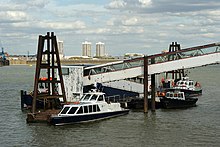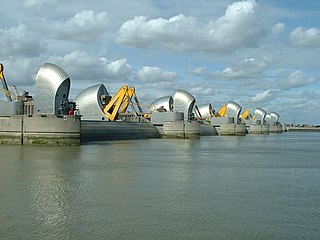
The Thames Barrier is a retractable barrier system built to protect the floodplain of most of Greater London from exceptionally high tides and storm surges moving up from the North Sea. It has been operational since 1982. When needed, it is closed (raised) during high tide; at low tide, it can be opened to restore the river's flow towards the sea. Built about 2 miles east of the Isle of Dogs, its northern bank is in Silvertown in the London Borough of Newham and its southern bank is in the New Charlton area of the Royal Borough of Greenwich.
The Port of London is that part of the River Thames in England lying between Teddington Lock and the defined boundary with the North Sea and including any associated docks. Once the largest port in the world, it was the United Kingdom's largest port as of 2020. Usage is largely governed by the Port of London Authority ("PLA"), a public trust established in 1908; while mainly responsible for coordination and enforcement of activities it also has some minor operations of its own.

The Port of London Authority (PLA) is a self-funding public trust established on 31 March 1909 in accordance with the Port of London Act 1908 to govern the Port of London. Its responsibility extends over the Tideway of the River Thames and its continuation. It maintains and supervises navigation, and protects the river's environment.
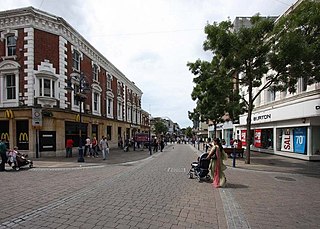
Gravesend is a town in northwest Kent, England, situated 21 miles (35 km) east-southeast of Charing Cross on the south bank of the River Thames and opposite Tilbury in Essex. Located in the diocese of Rochester, it is the administrative centre of the Borough of Gravesham. Gravesend marks the eastern limit of the Greater London Built-up Area, as defined by the UK Office for National Statistics.

London River Services Limited is a division of Transport for London (TfL), which manages passenger transport—leisure-oriented tourist services and commuter services—on the River Thames in London. It does not own or operate any boats itself, except those of the Woolwich Ferry, but licenses the services of operators.
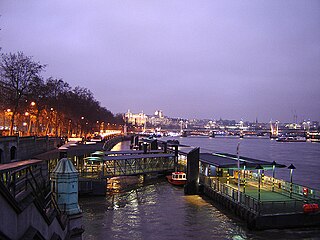
Westminster Pier is a pier on the River Thames, in the City of Westminster in London, England. It is operated by Uber Boat by Thames Clippers and served by various river transport and cruise operators. It is located next to Westminster Bridge on the north bank of the Thames, and is close to one of London's most prominent landmarks, Big Ben.
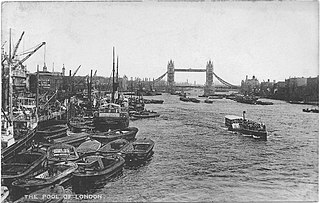
The Pool of London is a stretch of the River Thames from London Bridge to below Limehouse.
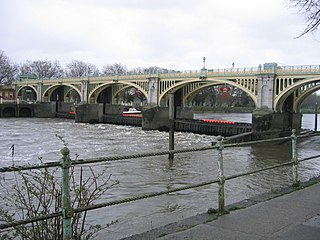
Richmond Lock and Footbridge is a lock, rising and falling low-tide barrage integrating controlled sluices and pair of pedestrian bridges on the River Thames in southwest London, England, and is a Grade II* listed structure. It is the furthest downstream of the forty-five Thames locks and the only one owned and operated by the Port of London Authority. It was opened in 1894 and is north-west of the centre of Richmond in a semi-urban part of southwest London. Downstream are Syon Park and Kew Gardens on opposite banks. It connects the promenade at Richmond with the neighbouring district of St. Margarets on the west bank during the day and is closed at night to pedestrians – after 19:30 GMT or after 21:30 when BST is in use. At high tide the sluice gates are raised and partly hidden behind metal arches forming twin footbridges.

Greenwich Pier is on the south bank of the River Thames in Greenwich, London. It was built in 1836 to cater for the many paddle steamers that brought visitors on day trips to Greenwich from London further up river. At the time, London's urban area did not extend as far out as Greenwich.

The Nore is a long bank of sand and silt running along the south-centre of the final narrowing of the Thames Estuary, England. Its south-west is the very narrow Nore Sand. Just short of the Nore's easternmost point where it fades into the channels it has a notable point once marked by a lightship on the line where the estuary of the Thames nominally becomes the North Sea. A lit buoy today stands on this often map-marked divisor: between Havengore Creek in east Essex and Warden Point on the Isle of Sheppey in Kent.

Havengore is a former hydrographic survey launch, originally launched in 1956 for service with the Port of London Authority (PLA). After her withdrawal from service and sale in 1995, she was re-registered as a passenger vessel for up to 40 passengers. Based on the River Thames, Havengore has also served as a ceremonial vessel. She is best known for carrying the body of Sir Winston Churchill as part of his state funeral in 1965.
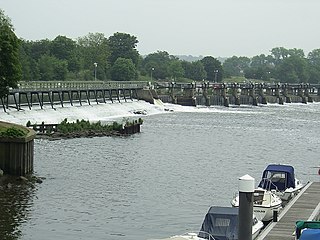
The Tideway is a part of the River Thames in England which is subject to tides. This stretch of water is downstream from Teddington Lock. The Tideway comprises the upper Thames Estuary including the Pool of London.

London Stone is the name given to a number of boundary stones that stand beside the rivers Thames and Medway, which formerly marked the limits of jurisdiction of the City of London.

Swan Island is a private mooring island in the Thames at Twickenham, in the London Borough of Richmond upon Thames, London, England. It is on the Tideway about 3⁄4 mile (1.2 km) north of and thus below Teddington Lock.

Brentford Ait is a long 4.572-acre (1.9 ha) uninhabited ait in the River Thames, without buildings, on the Tideway near Brentford in London, England.

Oliver's Island is a tree-covered 0.9-acre (0.36 ha) ait, in the River Thames in England. It is in the London Borough of Hounslow, on the Tideway, facing Kew and Strand-on-the-Green in the London Borough of Richmond upon Thames, and is owned by the Port of London Authority.

Royal Terrace Pier is owned and managed by the Port of London Authority (PLA) and is located adjacent to their headquarters at London River House in Gravesend.

10 Trinity Square is a Grade II* listed building in London, United Kingdom, overlooking the River Thames at Tower Hill, in the southeastern corner of the City of London. Built in the Beaux Arts style, it is best known as the former headquarters of the Port of London Authority and is thus also sometimes referred to as the Port of London Authority Building.

The foreshore of the River Thames in London, England, is the area of the riverbed revealed at low tide, and includes sections known as Tower Beach, Bermondsey Beach, and Folly House Beach, in Canary Wharf. These are tidal beaches that are covered by the water of the river at high tide.
